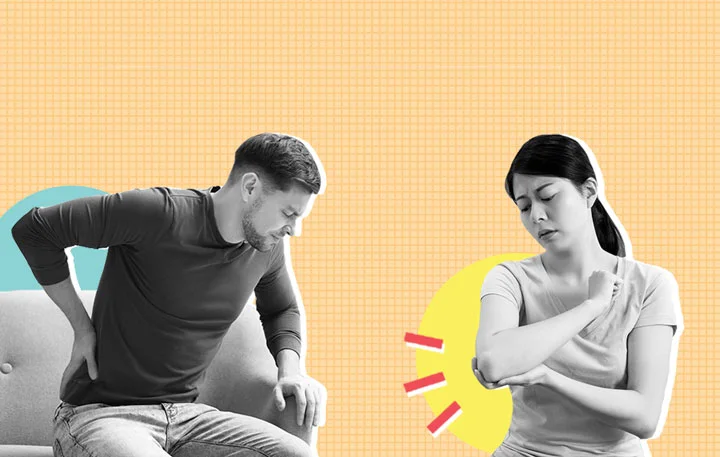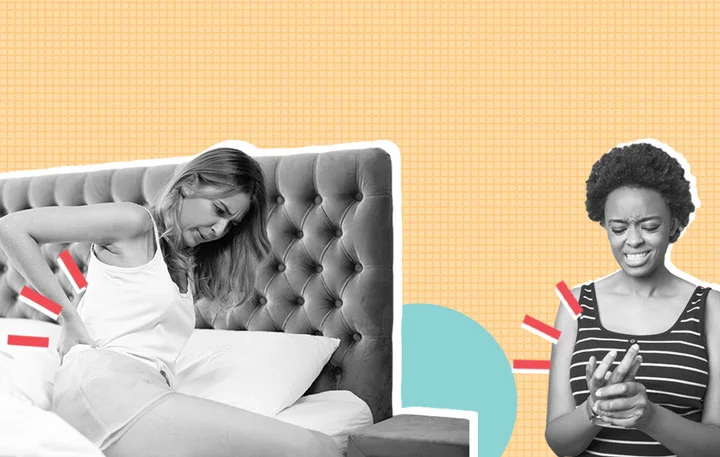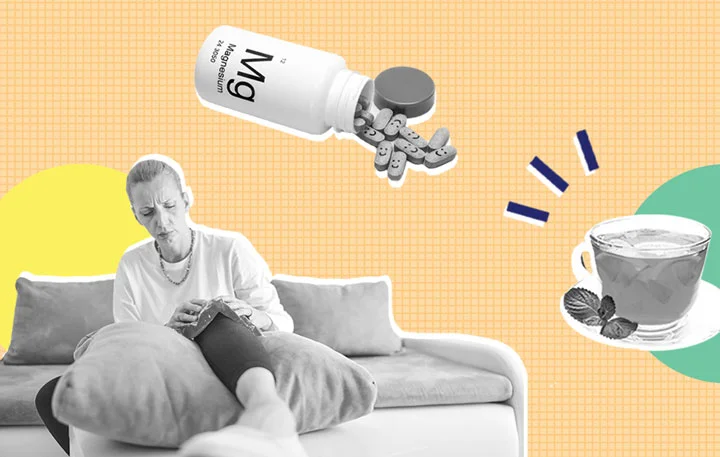Arthritis is a joint disorder that can disrupt sufferers’ quality of sleep. If you or your loved one has arthritis, we’ve put together some tips for better sleep despite this condition. We’ll also give an overview of arthritis, briefly discuss some types of arthritis, and cover how each type can impact sleep. Keep in mind that we aren’t medical experts, so please don’t take what we say as medical advice.
About Arthritis
Arthritis refers to any disorder that impacts the joints, which are where one bone meets another, such as the knee, wrist, and spine. It is literally translated in Latin as “joint inflammation,” which is a symptom that characterizes the disorder as a whole. (1)

Types of Arthritis
There are several types of arthritis, three of which we’ll dig in to before talking about how they can affect your sleep.
Osteoarthritis
According to a 2011 study in The Lancet, osteoarthritis (OA) is considered the most common chronic joint disease and is characterized by pain and loss of function in the affected areas, particularly in the hand, hip, and knee. The study also notes that OA is more likely to occur as we age, and that women 50 and older are more likely to have it than men of the same age. (2)
Rheumatoid Arthritis
Research from the US National Library of Medicine says rheumatoid arthritis (RA) affects the joints in the wrist and fingers, where it causes pain, swelling, stiffness, and loss of function. The research also notes that, like OA, RA is more common in women than in men. While it’s more prevalent among older people, it often begins in middle age. (3) RA may also be associated with inflammation of other organs.
Ankylosing Spondylitis
Ankylosing spondylitis (AS) is a debilitating, chronic inflammatory condition that impacts the spine as well as the joints that link your pelvis and lower spine. (4) Unlike the other forms of arthritis we’ve looked at, AS is 10 times more common in men, can develop during childhood, and is most prevalent in younger adults between the ages of 20 and 40. (5)
Arthritis and Sleep
According to Dr. Kim Langdon of Medzino, 80 percent of people who suffer from arthritis experience sleep issues. She also says that poor sleep can worsen joint pain and increase the likelihood of disability.
Board-certified clinical rheumatologist Magdalena (Maggie) Cadet agrees, saying that widespread body pain along with tender and stiff joints can make sleeping a problem for sufferers. Dr. Maggie says it’s common for individuals with arthritis to have trouble falling asleep, wake up too early, or wake up in the middle of night. According to Dr. Peter Bailey of Test Prep Insight, his arthritis patients are often woken up by pain multiple times throughout the night.
Let’s take a brief look at how each of the arthritis types we’ve discussed can impact sleep.

OA and Sleep
According to a 2016 study in Arthritis Care & Research that studied 367 people with OA, this disorder increases the risk of sleep issues. The pain caused by OA, the researchers say, is linked to depression. The constant pain can cause people to feel down, which can lead to depression. When combined, the pain and depression caused by OA makes it difficult to sleep. (6)
RA and Sleep
The majority of RA patients suffer from poor sleep quality, according to a 2017 study in Revista Brasileira de Reumatologia, in which researchers examined 112 people with RA. The study also notes that the depression and heightened risk of sleep apnea contribute to these sleep issues. (7)
In a 2020 Clinical Rheumatology study, researchers assessed 200 RA patients, and found that 86.5 percent dealt with a diminished quality of sleep, with 30 percent experiencing depression. The researchers concluded that sleep issues and depression continue to exist until a state of low disease activity is reached, meaning regular treatment should be considered. (8)
AS and Sleep
A 2012 study in Arthritis Research & Therapy examined 314 patients with AS and concluded that sleep issues are prevalent among folks with this disorder. The study also found that depression, anxiety, pain at night, and back pain, which are all associated with AS, serve as the primary reasons for sleep disturbances in people with this disorder. (9)
Sleeping Better With Arthritis
Now let’s take a look at some ways you can sleep better in spite of arthritis. Here are a few tips from various medical experts on this subject.

Warm or Cool Your Bed
Determine whether heat or cold does best to relieve your arthritic symptoms:
- If heat works better: Dr. Lynn M. Ludmer, the Medical Director of Rheumatology at Mercy Medical Center recommends using a heated mattress pad or electric blanket. This can get the blood flowing to stiff joints.
- If cold works better: Dr. Ava Williams of Doctor Spring recommends putting ice packs that do not leak or sweat on your mattress to help numb the pain. She says that some types of arthritis, such as psoriatic arthritis, are aggravated by heat. As a side note, psoriatic arthritis affects some folks who have psoriasis, which is a condition that causes scales and itchy patches on the skin.
Relax Before Bedtime
Dr. Maggie recommends wearing comfortable pajamas or a robe to help you relax. She also says you should avoid electronics with a blue light at least a half hour before bedtime. Such electronics can include a smartphone, laptop, or TV.
One way to avoid electronics, according to Dr. Langdon is by not keeping a phone by your bed. In addition, she recommends taking a shower or bath in the evening and stretching before you lie down.
Dr. Alyssa Kuhn of Keep the Adventure Alive suggests using your bedroom for only two things: sleep and sex. By not using it as a place where you watch TV, eat, or do other activities, you are setting your bedroom up as a place that cues your brain that it’s time to sleep.
Dr. Williams recommends sticking to a sleep schedule. She says that before bedtime, consider massaging your areas of pain using oils or other ointments to relax your muscles.
Watch What You Drink
According to Dr. Langdon, it is best to avoid caffeine in the afternoon. Dr. Maggie agrees, saying that in addition to caffeine, you should avoid alcohol before bedtime. Instead, she suggests drinking water or warm, decaffeinated tea.
Find the Right Mattress
Both Dr. Bailey and Dr. Maggie say that a person’s mattress selection can have a huge impact on relieving the effects of arthritis at night. Dr. Bailey says you should find a mattress that properly supports your spine. He says the mattress should not put undue pressure on your affected joints. In addition to looking for a new mattress, you may want to consider finding a mattress topper that alleviates back pain.
Finding the best mattress for arthritis is not one-size-fits-all. To make sure your spine is aligned and your arthritis isn’t aggravated, keep in mind the location of your arthritis, your weight, and your sleep position when choosing a mattress.
Dr. Bailey recommends choosing a softer mattress if you sleep on your side or back. He suggests a firmer mattress if you sleep on your stomach.
Choose the Right Sleep Position
Dr. Maggie suggests that using a pillow between your knees and under your back or stomach may possibly help relieve pressure on your back and knees. If you want to relieve pressure on your hips and back, she suggests lying in the fetal position, with your knees towards your chest.
Keep in mind where your arthritis is when choosing your sleep position. For instance, Dr. Bailey suggests not sleeping on your side if you have arthritis in your shoulders. He says the position you choose should properly support your spine without inflaming the joints where you have arthritis. Dr. Bailey says it may be necessary, even if it’s not easy, to switch to a new position to reduce your joint pain.
Consider Taking Natural Remedies
Sleep interventions that do not involve pharmaceuticals have been shown to help with sleep issues in people with chronic pain conditions, such as arthritis. (10) If you want to forego taking prescription drugs, Dr. Langdon says you should consider taking the following natural remedies on a short-term basis to help with arthritis:
- Magnesium threonine
- Melatonin
- Lavender
- Passionflower
- Threonine
- Tryptophan
- Ginkgo biloba
We at Sleepopolis recommend you consult your healthcare provider before taking any of these remedies.
Talk With Your Doctor
A 2020 Clinical Rheumatology study suggests that folks with arthritis, specifically RA, should see their doctors regularly. This should be done so that doctors can assess how those with RA are handling any issues with sleep or depression.
A 2012 study in Sleep agrees that clinically managing the pain of arthritis (in this case, RA), is necessary. The researchers explain that doctors should focus on the prevention and treatment of sleep disturbance in sufferers. (11)
Last Word From Dr. Maggie Cadet
“Poor sleep can result in increased levels of cortisol or stress hormones as well as growth hormones which may trigger disease flares. Sleep deprivation can also cause mood disturbances and it is already known that patients with arthritis can suffer from depression and anxiety.
Decreased sleep can also lead to increased risk of diabetes from cortisol and norepinephrine release affecting insulin resistance. High blood pressure may also be seen. Patients living with RA, lupus, and psoriatic arthritis have a higher risk of cardiovascular disease, so both of these risk factors should be managed or prevented.
Lastly, poor sleep can also lead to a weakened immune system. Patients with certain types of inflammatory arthritis can be more susceptible to infections because of their disease and the treatment which can suppress the immune system. By effectively treating your arthritis with medications such as disease modifying agents or medications called biologics that target chemicals causing inflammation, joint pain, swelling and stiffness can be reduced resulting in improved sleep.
Managing joint inflammation and pain can lead to better sleep periods and vice versa. Improving sleep hygiene is great for all individuals, but especially in patients battling arthritis and autoimmune diseases. A few additional tips:
- Make sure that your bedroom feels like a clean and decluttered space
- Consider white noise to block loud or distracting noises
- Take a warm bath or shower to relax those muscles
- Try to have a partner give a massage or use a massage tool for muscle relaxation
- Exercise daily preferably in morning or afternoon to get those endorphins pumping which helps with sleep-wake rhythms
- Limit your daytime naps if you can”
References
- “Arthritis.” National Institute of Arthritis and Musculoskeletal and Skin Diseases. https://www.niams.nih.gov/health-topics/arthritis
- Bijlsma, J et al. Osteoarthritis: an update with relevance for clinical practice. The Lancet. Jun 2011.
- “Rheumatoid Arthritis.” US National Library of Medicine. https://medlineplus.gov/rheumatoidarthritis.html
- Robinson, P et al. Genetics of ankylosing spondylitis. Molecular immunology. Jul 2013.
- “Ankylosing Spondylitis.” Harvard Health Publishing. Oct 2019. https://www.health.harvard.edu/a_to_z/ankylosing-spondylitis-a-to-z
- Parmelee, P et al. Sleep Disturbance in Osteoarthritis: Linkages with Pain, Disability and Depressive Symptoms. Arthritis Care & Research. Mar 1, 2016.
- Goes, A et al. Rheumatoid arthritis and sleep quality. Revista Brasileira de Reumatologia. Aug 2017.
- Hughes, M et al. A cross-sectional study of sleep and depression in a rheumatoid arthritis population. Clinical Rheumatology. Sep 24, 2020.
- Li, Y et al. Sleep disturbances are associated with increased pain, disease activity, depression, and anxiety in ankylosing spondylitis: a case-control study. Arthritis Research & Therapy. Oct 11, 2012.
- Tang, Nicole K Y et al. “Nonpharmacological Treatments of Insomnia for Long-Term Painful Conditions: A Systematic Review and Meta-analysis of Patient-Reported Outcomes in Randomized Controlled Trials.” Sleep. Nov 1, 2015.
- Irwin, M et al. Sleep Loss Exacerbates Fatigue, Depression, and Pain in Rheumatoid Arthritis. Sleep. Apr 1, 2012. 11. Tang, N et al. Nonpharmacological Treatments of Insomnia for Long-Term Painful Conditions: A Systematic Review and Meta-analysis of Patient-Reported Outcomes in Randomized Controlled Trials. Sleep. Nov 1, 2015.

























